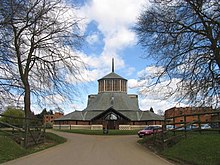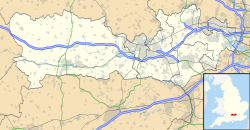Douai Abbey
| Douai Abbey | |
|---|---|
 | |
| 51°24′33″N 1°10′19″W / 51.409185°N 1.171846°W | |
| OS grid reference | SU5770468214 |
| Location | Woolhampton, Berkshire |
| Country | United Kingdom |
| Denomination | Roman Catholic |
| Website | www.douaiabbey.org.uk |
| History | |
| Status | Monastery |
| Founded | 1615 |
| Founder(s) | Dom Gabriel Gifford |
| Dedication | St Edmund the Martyr |
| Dedicated | 1933 |
| Events | 1615 Founded in Paris 1818 Moved to Douai |
| Architecture | |
| Functional status | Active |
| Heritage designation | Grade II* |
| Designated | 10 November 1980 |
| Architect(s) | J Arnold Crush |
| Style | Gothic Revival |
| Groundbreaking | 1903 |
| Completed | 1993 |
| Administration | |
| Province | Southwark |
| Diocese | Portsmouth |
| Deanery | West Berkshire |
| Clergy | |
| Bishop(s) | Rt Rev Philip Egan |
| Abbot | Rt Rev Paul Gunter OSB |
Douai Abbey is a Benedictine Abbey at Upper Woolhampton, near Thatcham, in the English county of Berkshire, situated within the Roman Catholic Diocese of Portsmouth. Monks from the monastery of St. Edmund's, in Douai, France, came to Woolhampton in 1903 when the community left France as a result of anti-clerical legislation. The abbey church is listed Grade II* on the National Heritage List for England.[1]
History
[edit]The community of St. Edmund was formed in Paris in 1615 by Dom Gabriel Gifford, later Archbishop of Rheims and primate of France. With his backing the community flourished. Expelled from Paris during the Revolution, the community took over the vacant buildings of the community of St Gregory's in Douai in 1818.
Amid the political upheavals caused by the Dreyfus affair around the turn of the 19th century, the French prime minister Waldeck-Rousseau introduced an anti-clerical Law of Associations (1901) that "severely curbed the influence of religious orders in France".[2] This led to the community being given the minor seminary of St. Mary in Woolhampton by Bishop Cahill of Portsmouth, moving from Douai to Woolhampton in 1903. The abbey church was opened in 1933 but only completed in 1993 due to financial constraints.[3]
The monastery was greatly expanded in the 1960s with the building of the new monastery designed by Sir Frederick Gibberd. The abbey had in its charge Douai School until the latter's closure in 1999. In 2005, two monks returned to Douai, France to form a community there and restore the historic links to English monasticism.[4]
Jacobitism
[edit]The monastery and its community have traditionally maintained strong links to the Stuart dynasty and the Jacobite cause; with King James II of England buried in the monastery in Saint-Germain-en-Laye, near Paris (the community's home from the early 17th century till the French Revolution and the community's relocation to Douai in northern France), members of the House of Wittelsbach (present pretenders to the Jacobite claim) being educated at the community's former boarding school (at their present location), and the immediate past abbot, Geoffrey Scott OSB, is a member of the Jacobite Society.[5]
Present
[edit]In July 2014 a monk was ordained priest, the first priestly ordination since 2007. As of 2020, the community consisted of 23 monks.[6] The monks serve in parishes across five dioceses.[7] The patron of the monastery is St Edmund King and Martyr, whose feast day is 20 November.
Music
[edit]The Abbey Church houses two pipe organs, a smaller organ[8] of 1978 in an Italian style by Tamburini and a larger organ[9] of 1994 in a modernised English Classical style by Kenneth Tickell.
Because it contains these organs, and especially because of its unique and reverberant acoustics, the Abbey Church is frequently used as a recording location by musical performers. Commercial albums recorded there include:
- Carlo Gesualdo - Tenebrae by The Hilliard Ensemble (March 1990).[10]
- Pierre de la Rue - Missa Cum Iocunditate, Motets by The Hilliard Ensemble (1997).[11]
- The Old Hall Manuscript by The Hilliard Ensemble (1990).[12]
- Cristobal de Morales - Mass For The Feast Of St. Isidore Of Seville by the Gabrieli Consort & Players, directed by Paul McCreesh (2003).[13]
- A New Venetian Coronation 1595 by the Gabrieli Consort & Players, directed by Paul McCreesh (2012).[14]
- Handel Organ Concertos by Baroque Belles and David Willcocks (1999).[15]
- MacMillan And His British Contemporaries by the choir of New College, Oxford (2006).[16]
- Rutter: Requiem by the choir of Clare College, Cambridge (2003).[17]
List of Abbots
[edit]- 1900–1904: Lawrence Larkin
- 1904–1905: Ambrose Bamford
- 1905–1913: Stanislaus Taylor
- 1913–1921: David Hurley
- 1921–1929: Edmund Kelly
- 1929–1969: Sylvester Mooney
- 1969–1989: Gregory Freeman
- 1989–1990: Leonard Vickers
- 1990–1998: Finbar Kealy
- 1998–2022: Geoffrey Scott
- 2022-present: Paul Gunter[18]
Gallery
[edit]-
Abbey
-
Abbey and school
-
Abbey church
See also
[edit]References
[edit]- ^ Historic England. "Douai Abbey Church (1156252)". National Heritage List for England. Retrieved 23 July 2017.
- ^ Schultenover, David G. (1999). "An Anthropological View of the Modernist Crisis". Journal of Religion and Society. 1. ISSN 1522-5658. Archived from the original on 12 August 2007. Retrieved 9 September 2007.
- ^ The Rt. Rev. Abbot Geoffrey Scott, O.S.B., The History of Woolhampton Parish Archived 21 October 2016 at the Wayback Machine November 2005
- ^ April 2011, Douai Abbey Newsletter archived.
- ^ James II, British Royal Family History. Retrieved 6 February 2013
- ^ The Benedictine Yearbook. London: English Benedictine Congregation Trust. 2020. p. 108. ISBN 978-0-901089-58-8.
- ^ The Benedictine Yearbook. London: English Benedictine Congregation Trust. 2020. p. 26. ISBN 978-0-901089-58-8.
- ^ NPOR N09904, [1]. Retrieved 10 March 2021
- ^ NPOR D03336, [2]. Retrieved 10 March 2021
- ^ Hilliard, Gesualdo: Tenebrae. Retrieved 25 February 2021
- ^ Discogs, [3]. Retrieved 10 March 2021
- ^ Discogs, [4]. Retrieved 10 March 2021
- ^ Discogs, [5]. Retrieved 10 March 2021
- ^ Discogs, [6]. Retrieved 10 March 2021
- ^ Discogs, [7]. Retrieved 10 March 2021
- ^ Discogs, [8]. Retrieved 10 March 2021
- ^ Discogs, [9]. Retrieved 10 March 2021
- ^ Monks of St Edmund's from douaiabbey.org.uk retrieved 14 March 2018
External links
[edit]- Official website
- Douai Parish Website
- Photographs of the Abbey
- Historic England. "Abbey church, grade II* (1156252)". National Heritage List for England.
- Historic England. "Gatehouse, grade II (1117269)". National Heritage List for England.
- Historic England. "Hall, grade II (1319513)". National Heritage List for England.
- Historic England. "Block 15m N of gatehouse, grade II (1156201)". National Heritage List for England.
- Historic England. "Range 50m N of gatehouse, grade II (1117270)". National Heritage List for England.
- Historic England. "Block 30m NE of gatehouse, grade II (1156246)". National Heritage List for England.
- Christian organizations established in 1903
- Benedictine monasteries in England
- Grade II* listed churches in Berkshire
- History of Berkshire
- Grade II* listed Roman Catholic churches in England
- Monasteries in Berkshire
- Monasteries of the English Benedictine Congregation
- Organisations based in Berkshire
- Roman Catholic churches completed in 1933
- Roman Catholic churches in Berkshire
- 1903 establishments in England
- Christian monasteries established in the 20th century
- 20th-century Roman Catholic church buildings in the United Kingdom
- Woolhampton





